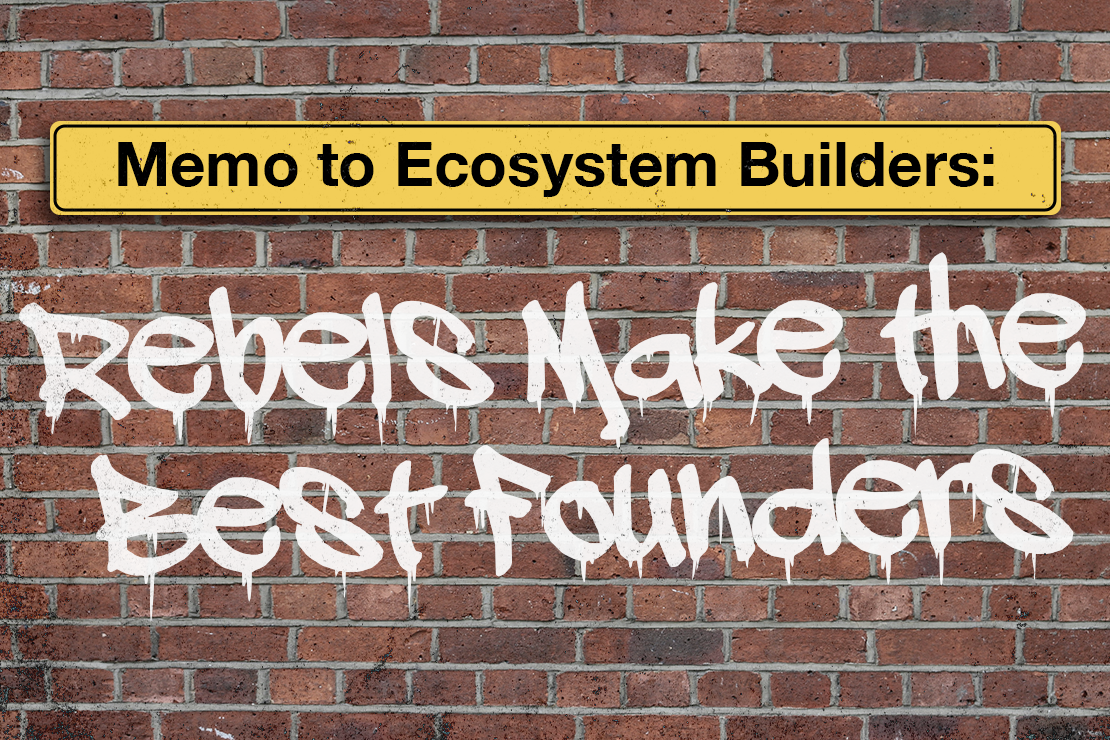Memo to Ecosystem Builders: Rebels Make the Best Founders
Apr 07, 2025

By Chris Heivly, Managing Director at Build The Fort and Startup Community EIR @ Techstars
Let’s get real for a minute. Entrepreneurship, in its purest form, is about disruption. It’s about questioning the way things have always been done and having the rebel guts to build something better, faster or cheaper. So why does it feel like the very organizations created to support entrepreneurs are more focused on preserving the status quo than challenging it?
In too many cities I have worked in — especially in developing or nascent startup communities — I sometimes observe that the entrepreneurs who get the most support are the ones who disrupt the least. The ones who play nice. The ones who fill out the forms correctly, show up to every pitch competition in a blazer, and know how to say all the right buzzwords in all the right order. In other words, the ones who fit the mold of what some outdated playbook says an entrepreneur should look like.
And that’s a problem. That is a big problem for your ecosystem.
Because the ones we should be paying attention to — the true builders, the challengers, the rebels — don’t always fit that mold. They’re too busy trying to change the game to play by the rules we’ve set. And yet, instead of seeing them as the fuel for a thriving, forward-moving community, we often see them as a threat. Or worse, we ignore them altogether.
I have never looked the part. I didn't have an MBA when that was a prerequisite for doing big things in a company. I am a product guy when executives were created from finance or operations. I am from Philadelphia so every so often my accent and what I call the “d’s, dem’s, don’t’s" sneak out. I can’t dress for success, I have never worn a watch and sometimes my hair gets really really long.
Many powerful people dismiss me before even getting to know me. I do not look or act like them — just like many of the best rebel founders.
The best rebel founders make us uncomfortable. They question the workshops we host. They don’t buy into the idea that a coworking space is the holy grail. They ask hard questions at meetups and roll their eyes at performative panels. In short, they disrupt our systems — and when that happens, we don’t celebrate them. We sideline them.
Here’s the twist: most ESOs (entrepreneurial support organizations) were built to create systems — repeatable, fundable, trackable systems. And to be fair, systems can bring order to chaos. But when those systems become the gatekeepers of who gets access to resources, mentorship, or capital, we’ve lost the mission we were set to execute on.
The hard truth? We can’t build a community of disruptors while asking everyone to conform to one system.
We need to stop building startup communities that look good on paper and start building ones that are messy, real, and honest.
So this is your call to speak up. If you’re an entrepreneur who doesn’t fit the mold — don’t shrink. And if you’re part of an ESO, ask yourself if your systems are serving entrepreneurs or just serving your KPIs.
Disruption doesn’t come from comfortable systems. It comes from rebel thinkers who dare to push us to uncomfortable places.
Learn more about Techstars Startup Community partnerships, a new way for you to build your thriving startup community as a member of the Techstars network.
About the Author

Chris Heivly
Chris is one of the nation’s leading experts on launching startups and has been dubbed the “Startup Whisperer.” He co-founded MapQuest, is an angel investor, ran a corporate venture fund and 2 micro venture funds (directed over $75M), and was most recently SVP Innovation with Techstars. Chris just released his new book, The Startup Community Builder’s Field Guide for founders, investors and economic development leaders to better accelerate their ecosystem.
